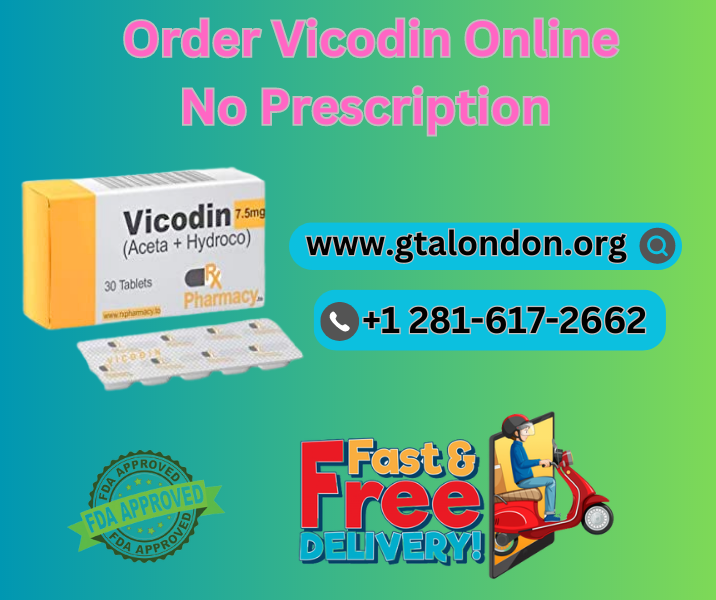
+1-281-617-2662

Buy Vicodin 7.5/750 mg Online
What are Vicodin Tablets
Vicodin is typically used to treat moderate to severe pain, and it works by binding to opioid receptors in the brain and spinal cord.
Vicodin is a brand name for a prescription pain medication that contains two active ingredients: hydrocodone and acetaminophen. Hydrocodone is an opioid pain reliever, while acetaminophen is a non-opioid pain reliever and fever reducer.
How does it work?
Vicodin works by binding to opioid receptors in the brain and spinal cord, which are part of the body's natural pain-relieving system. Hydrocodone, one of the active ingredients in Vicodin, is an opioid agonist, which means it activates these receptors and reduces the transmission of pain signals in the central nervous system. Acetaminophen, the other active ingredient in Vicodin, is a non-opioid pain reliever that works by inhibiting the production of certain chemicals in the body that cause pain and fever. Together, hydrocodone and acetaminophen provide a stronger and more effective pain relief than either drug could alone.

How to take it?
Vicodin should only be taken as directed by a healthcare provider. It is usually taken orally as a tablet, with or without food. The dosage and frequency of Vicodin will depend on the severity of the pain and the individual's response to the medication.
It's important to follow the dosing instructions provided by the healthcare provider and not to exceed the recommended dose. Taking too much Vicodin can cause serious side effects, including respiratory depression, which can be life-threatening.
If you miss a dose of Vicodin, take it as soon as you remember. However, if it's almost time for the next dose, skip the missed dose and continue with the regular dosing schedule. Do not double the dose to make up for a missed dose.
Never share Vicodin with others, as it can be habit-forming and lead to addiction.
Side Effects
Here are some common side effects of Vicodin:
Drowsiness
Dizziness
Nausea
Vomiting
Constipation
Headache
Dry mouth
Itching
Sweating
Mood changes
Blurred vision
Difficulty urinating
Respiratory depression (slowed breathing)
Allergic reactions, including hives, rash, and swelling of the face, lips, tongue, or throat.
It's important to contact a healthcare provider if any of these side effects persist or worsen, or if you experience any other unusual symptoms while taking Vicodin. In rare cases, Vicodin can cause serious side effects, such as liver damage, and it can also lead to addiction and overdose.
Precaution
Here are some precautions to keep in mind when taking Vicodin:
Vicodin can cause drowsiness and dizziness, so avoid driving or operating heavy machinery until you know how the medication affects you.
Vicodin can be habit-forming and lead to addiction, so use it only as directed by a healthcare provider and never share it with others.
Do not take Vicodin if you are allergic to hydrocodone or acetaminophen or if you have severe asthma or breathing problems.
Inform your healthcare provider about any other medications you are taking, including prescription and over-the-counter drugs, as Vicodin can interact with other medications and cause serious side effects.
Inform your healthcare provider if you have a history of liver or kidney disease, alcoholism, or drug abuse, as these conditions can affect how your body processes Vicodin.
Avoid consuming alcohol while taking Vicodin, as it can increase the risk of liver damage and other side effects.
Do not stop taking Vicodin abruptly, as it can cause withdrawal symptoms. Talk to your healthcare provider about how to gradually taper off the medication if necessary.
Keep Vicodin out of reach of children and pets, as it can be fatal if taken in large amounts.
Always follow the dosing instructions provided by your healthcare provider and contact them if you have any questions or concerns about taking Vicodin.




